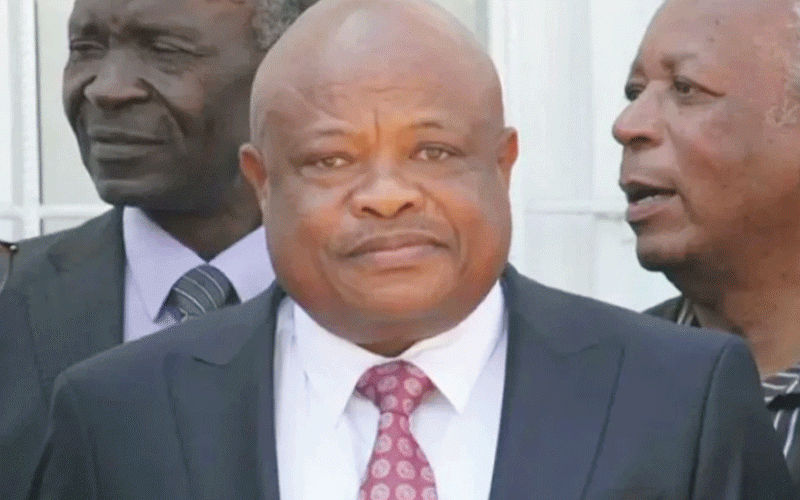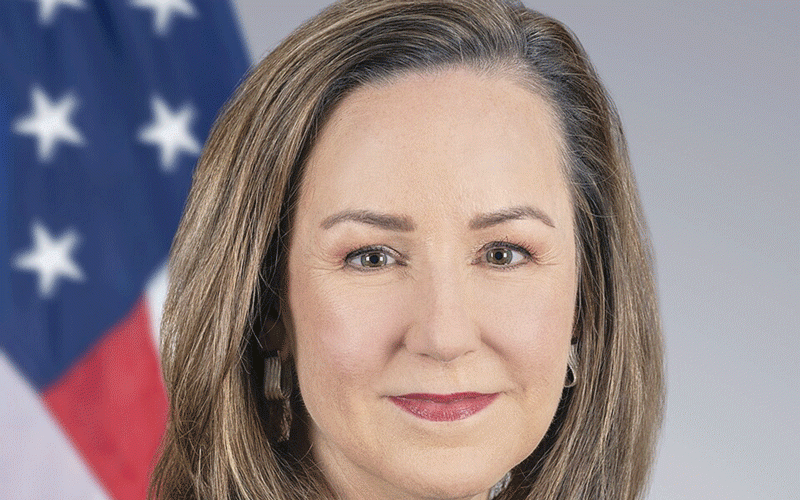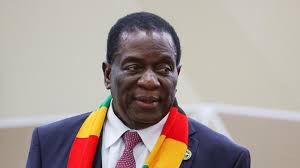
President Emmerson Mnangagwa inaugurated commissioners of the Zimbabwe Independent Complaints Commission (Zicc) last year. Zicc is a constitutional body mandated to address public grievances against members of Zimbabwe’s security system. In this wide-ranging interview, our deputy news editor Tinashe Kairiza (TK) speaks to Webster Chinamora (WC,), chairperson of the agency about the journey so far. Below are interview excerpts:
TK: You lead the constitutional body, which is composed of individuals drawn from various sectors with diverse professional backgrounds. Tell us about your experience so far?
WC: It is both challenging and rewarding to lead a commission comprising a team of individuals from diverse sectors and professional backgrounds. In this respect, Elizabeth Rutsate (who is the deputy chairperson) is a lawyer and academic; Andrew Mataruse is a medical doctor (specialist physician and neurologist); Oliver Mandipaka hails from the security sector as a former police commissioner; and Kudakwashe Muchena is a psychologist. While this diversity ensures that different perspectives are placed on the table, there still remains the imperative to build a cohesive team aligned to our constitutional mandate. To achieve this, we conduct regular strategic planning sessions that foster open dialogue and collective problem-solving.
TK: The commission started work in 2024. How many complaints has it received so far, and how is the body dealing with those complaints?
WC: Since commencing operations in September 2024, the commission has received 15 complaints. We have a structured protocol for dealing with complaints. Firstly, we do this by subjecting them to an assessment process to determine urgency and severity. Secondly, there is referral to our investigations team for investigation and gathering of evidence, to enable the commission to determine whether there is sufficient evidence to substantiate the complaint. We have a number of options in terms of the Zicc Act [Chapter 10:34], such as, referring the complaint back to the security sector complained against for it to utilise its internal procedures where we perceive that they adequately address the complaint. In cases implicating a criminal element, we refer the cases to the Prosecutor-General’s Office for possible prosecution. We have to date not referred any case to the National Prosecuting Authority.
TK: Any challenges you have encountered so far?
WC: Of course, we have encountered challenges and teething problems as a relatively new institution. We are in the process of recruiting key institutional staff. In this respect, we have benefited tremendously from highly-qualified and experienced staff seconded by the Office of the President and Cabinet, Public Service Commission, Judicial Service Commission and the Prisons and Correctional Services. Besides, we have since advertised the post of executive secretary, and interviews will commence soon. In addition, we are developing operational systems, and getting regulations contemplated by the Zicc Act published as a statutory instrument. Other challenges include raising public awareness, refining internal processes and scaling operational capacity. We are going to address these through nationwide campaigns; digitalising our complaints handling system, and staff training. Additionally, we will have meaningful collaborations with other government agencies, whose work either overlaps with ours or complements ours; human rights commissions; civil society and the media.
TK: What is the specific nature of those complaints?
- Mr President, you missed the opportunity to be the veritable voice of conscience
- ED to commission new-look border post
- Zanu PF ready for congress
- EU slams Zim over delayed reforms
Keep Reading
WC: The complaints received so far, in the majority, are against alleged misconduct by members of the police force. Mainly, the misconduct complained of consists of physical assault, failure to respond to incidents and abuse of office, such as, alleged acts of recovering civil debts through use of arrest and detention of complainants. I also note that cases of administrative fairness (or lack of it) have been reported to the commission, namely, delays in service delivery, alleged misuse of the search procedure through warrants of search and seizure.
TK: Is there scope for Zicc to handle grievances relating to incidents that occurred before its formation?
WC: Section 210 of the Constitution is the one which gave rise to the creation of the Zicc, which has a mandate to investigate complaints from the public on misconduct by members of the security sector, and come up with appropriate remedies.
This mandate was operationalised through the Zimbabwe Independent Complaints Commission Act [Chapter 10:34], effective from 2022, with Commissioners assuming office in 2024.
However, Section 13(2) of the Act imposes a statutory limitation, stating that the Commission may only investigate complaints submitted within three years of the alleged incident. While the Commission cannot initiate formal investigations into such historical grievances, if we receive them, we can facilitate inter-agency referrals for potential redress, for example, to the Zimbabwe Human Rights Commission.
TK: Has Zicc conducted a study or research on how other countries address complaints raised against security forces? If so, what lessons can Zicc draw from that?
WC: Zicc recognises the value of drawing from international experience to strengthen its systems and approaches. While formal benchmarking visits have not yet taken place, these are planned as part of our institutional development roadmap. The aim is to visit peer institutions in South Africa, Kenya, the United Kingdom and Australia. We can benefit a lot from their experience in transparency, public accountability, and operational independence.
Pending the benchmarking visits, we are conducting desk studies of international best practices. Our ultimate goal is to develop a hybrid model, which is sensitive to Zimbabwe’s constitutional and legal framework, economic and socio-political circumstances.
TK: There are allegations that inmates are subjected to inhumane treatment at the hands of prison officers. How well equipped is Zicc in terms of addressing that challenge?
WC: We have so far not received a complaint of custodial abuse. However, we are equipped to deal with such complaints when they come. Firstly, the expertise in the Commission lends itself well to confront such complaints. I am a former judge (lawyer if you like), the deputy chairperson is also a lawyer.
l To read full article visit www.theindependent.co.zw.
There is a medical doctor, a psychologist and a retired senior police officer. Secondly, the Zicc Act gives the Commission power to inspect detention facilities.
Thirdly, we have members of staff with investigation experience. Finally, the sincerity we have seen in the top brass of the security sector has left no doubt that they will co-operate in any investigation the Commission may conduct and implement suggested correctional remedies. I say so because the Commission has met the Minister of Defence, the Minister of Home Office and Cultural Heritage, the Commissioner General of Police, the former Director General of the Central Intelligence Services and the Director General of Prisons and Correctional Services.
TK: What measures are you putting in place to cultivate trust within the public to seek recourse from the commission?
WC: Let me state the obvious. Public confidence is central to our work. Consequently, we are putting in place mechanisms to raise awareness of the Commission’s work and to ensure that our processes are accessible, fair, and respectful to all who engage with us.
Our efforts include outreach, stakeholder consultation, and training of staff to handle complaints with professionalism and empathy.
TK: Last year, you told the Zimbabwe Independent that you resigned from the bench due to health reasons. How are you faring in your new role?
WC: Transitioning from the judiciary to the Zicc has not been too onerous. Despite the health issues which bedevilled the later part of my judicial career, I am delighted (if not, excited) that I am still able to contribute to the delivery of justice and fairness through the commission’s critical oversight role over the conduct of the security services vis-à-vis their interactions with members of the public. My previous work as a judge entailed dealing with cases before me impartially, fairly and observing the rule of law. This experience has proved invaluable in the discharge of my current role as chairperson of Zicc. I am proud to say I am fully dedicated to this new chapter supported by a capable, industrious and committed team.
TK: The commission requires financial support to carry out its mandate. Has the Treasury availed sufficient funding towards that?
WC: On funding, I am grateful for the support that the government has given us from the onset. In this connection, the Office of the President and Cabinet purchased the commissioners’ vehicles and operational pickup trucks. I wish to add that initial Treasury disbursements have enabled Zicc’s foundational set-up. Nevertheless, sustained funding remains pivotal for long term sustainability and effectiveness. My fellow commissioners, secretariat and I will continue constructive dialogue with government stakeholders so as to secure adequate resources. Simultaneously, we are exploring partnerships with development agencies in order to supplement budgetary allocations. For example, we recently signed a memorandum of understanding with the Zimbabwe Peace Building Trust. In all these endeavours, we strive to meet our mandate without compromising our independence.
TK: Your parting shot.
WC: Let me conclude by stating that Zicc remains steadfast and committed in its mission to uphold accountability and justice and to play a role in creating good relations between the public and the security sector.









